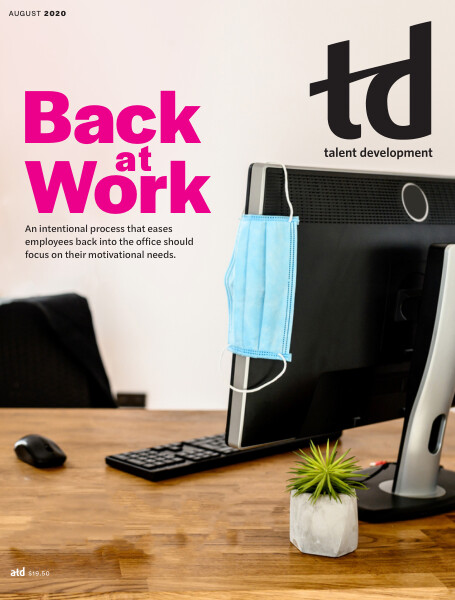TD Magazine Article
Performance Management No Longer Is a Numbers Game
Liberty Latin America shifted away from ratings and toward quarterly conversations.
Fri Jul 31 2020

Gallup research indicates that only 14 percent of employees strongly agree that performance reviews inspire them to do better. Not only are they ineffective, they come at a cost. In Gallup's "More Harm Than Good: The Truth About Performance Reviews," Robert Sutton and Ben Wigert reveal that performance reviews cost organizations between $2.4 million and $35 million a year in lost hours for a company of 10,000 employees as they participate in this fruitless endeavor. Why, then, do employers continue the morale-sucking annual rite?
For many organizations, it's because they know of no other way to dole out bonuses or advance their employees. But because studies have found that money is not the main motivator for employees, companies are rethinking that argument. As the Entrepreneur article "7 New Trends Top Companies Use to Separate Performance from Compensation" explains, "To provide their employees with more opportunities to grow and develop, many companies are now moving to continuous, peer-based and rating-less systems." Such companies may give managers more leeway in awarding pay increases, while other companies ask employees to provide more feedback, and still other organizations consider team performance.
Liberty Latin America—a communications and entertainment services company with operations in Chile, Puerto Rico, the Caribbean, and other parts of Latin America—is among the businesses that have ditched the annual performance review in favor of more periodic conversations. An independent public company for some 2.5 years, it initially prioritized talent initiatives around creating an organizational culture for employees that is both authentic and aspirational. Once the leadership was comfortable with where the company was with respect to having an organizational culture of authenticity and aspiration, the company set a goal to revamp its performance management approach. It sought to go from once a year to a more agile system—"something that better aligns with our philosophy and ways to working as one team," explains Kerry Scott, chief people officer and senior vice president. She oversees HR strategy, leadership development and training, talent management, reward and benefits, and culture and engagement.
The need for a new approach
Employers are shifting away from annual look-back performance discussions for many reasons. In addition to the cost and lack of effectiveness, employees are increasingly expecting more frequent conversations around their goals and development. Employees, to a greater degree, are taking the reins of their development into their own hands, but they want and need assistance from their managers. Additionally, in this new, churning business environment, organizational priorities may change much more frequently than they have in the past, whether annually or the more-than-outdated five-year plan.
Liberty Latin America is "committed to technological innovation to deliver transformational products and services that help improve and simplify the digital lives of our customers"—and that will only happen with a committed workforce.
As Scott notes, "People are what drive a business forward" and need to be engaged. She adds that giving them a grade or number doesn't lead to engagement. "We wanted to move away from one conversation at a fixed time each year that looks back on an employee's performance, focuses on what they delivered, and grades them with an annual performance rating."
Instead, the company wanted a more communicative approach. Liberty Latin America had already laid the groundwork for that shift, creating a culture that relies on honesty and trust. For the system to work, however, Scott and her team needed buy-in from leadership and needed managers to be allies in serving as a key part of the communications strategy, acting as role models, and making the time to prioritize having conversations with their direct reports.
The means to a strong finish
Well-aware that many organizations were stepping away from annual performance reviews, Scott spent several years learning about what other employers were doing. She talked to companies about how they began the shift toward something better. From those conversations and other research, she determined it was critical to "pick the right moment, have the right sponsorship, and link to a shift in culture."
In January 2019, the moment was right. Rather than the annual performance review, Liberty Latin America initiated what Scott calls a "performance experience" for all its employees. It involves quarterly conversations, or touchpoints, between employees and their direct managers during which they talk about goals and future development plans—a crucial part of the system being about development.
It's not just what employees are doing but also how they are doing it, explains Scott: "Instead of ‘What have you achieved over the last year?' we are moving toward ‘How did we get to where we are today, and what are we going to do to build on this?'"
The first of the quarterly conversations takes place at the beginning of the year and lays out employee goals for the coming year. The goals must align with overall business strategy, as well as their functional team and manager goals. At the second touchpoint, the employee and manager primarily discuss development and career aspirations but also review the established goals, update them as needed, and talk about what actions are needed to move forward.
The second half of the year, beginning with the third touchpoint, is a check-in to see where the employee is and serves as an opportunity for the manager to provide any feedback. The rationale is to ensure that the employee finishes the year strong. The final touchpoint includes reflection, a summary of how the manager and employee felt the year went, and a determination of whether both are happy with the conversations they had.
High-level sponsorship
In addition to picking the right moment, Scott sought the right sponsor. As is often repeated, change needs to come from the top—and change initiatives have a greater chance of success if they have a senior leader sponsor. For Scott and Liberty Latin America, that sponsor is President and CEO Balan Nair, who believed in the agile performance management shift from the get-go. In fact, it was Nair who "wanted to innovate and treat our employees as adults," Scott says.
Nair posits that people have been graded their entire lives, so rather than a once-a-year grade, "We should be talking about our performance all year long." In addition to depending on Nair's leadership, Scott involved the rest of the executive team, who took part in workshops, offered feedback, and—probably most important—took ownership of the new approach.
Communications strategy
With buy-in from the top achieved, Scott unveiled the new performance management system to staff with a thoughtful communications strategy in mind. To kick off the process, roughly 100 leaders from across the organization participated in a call to learn more about the new program and ask questions. The ensuing step was to announce the initiative via conference call to a broader team responsible for the HR function, so team members could learn the details about the new approach and have their questions answered.
The talent management team subsequently trained the local people teams via face-to-face sessions to ensure they received the message in the manner it was intended. Those training sessions also reinforced the fundamentals of the new performance management system across all the company's markets.
Continuing the dissemination of information about the system, managers met during a social gathering to more informally chat about what they believed the new process meant for them and their direct reports. At that point, Scott and her team distributed the more widespread messaging and made it available to all employees. The communications campaign included a company-wide message, video, signage and other collateral in offices, and interactive live chat sessions.
To monitor the initiative's success, Scott's team created a change management road map that provides insight on checkpoints, gathered feedback on the messaging that her team needed to reinforce, and helped ensure that all employees were actively participating in the change via regular check-ins including short surveys.
Management training
To strengthen the agile performance management system after the company unveiled the program, Scott's team focused on giving managers the tools to implement the system more fully and richly. Throughout the launch period, the team provided training via remote or face-to-face sessions depending on the market.
While the system is still early in its implementation, the manager tools include guidance on what mangers should discuss during each of the touchpoint conversations, with suggested questions and topics to address. Moving forward, Scott's team will provide managers with coaching and feedback skills so they, as she notes, "can be prepared to drive their employees' performance and career, having impactful conversations." That is not something that will happen overnight, the company realizes. "But together, we can do this. We're committed to this journey."
Results
Nair explains the company's logic behind the frequent conversations and check-ins: "Our lives and our jobs are so much more complex than a single number at the end of the year. And therefore, I am really so happy that our new performance management system does not have a 1, 2, 3, 4, and 5. We should be talking about our performance all year long, and that's how it should be."
Scott adds: "When thinking about people, talent, and performance management, companies need to move beyond a numbers game and start to put employees at the heart of their own development."
The new performance management approach has also resonated with employees. For example, Maarten Hekking notes that "getting regular feedback, giving regular feedback allows you to build on your strength and develop that further." Greicy Jean opines, "This new approach will allow us to be the number one company in this country." And Pedro Baez exudes that it's a great experience. Those comments are a far cry from the earlier reported Gallup figures.
With the positives being shared, Scott admits that the company is in the nascent stages. "We are still at the beginning of this huge change process, so we expect to learn from the experience and share our process with others in the near future."
Liberty Latin America
Industry: Telecommunications
Workforce Size: 10,000
HQ Location: Denver, Colorado
Founded: 2017
You've Reached ATD Member-only Content
Become an ATD member to continue
Already a member?Sign In

